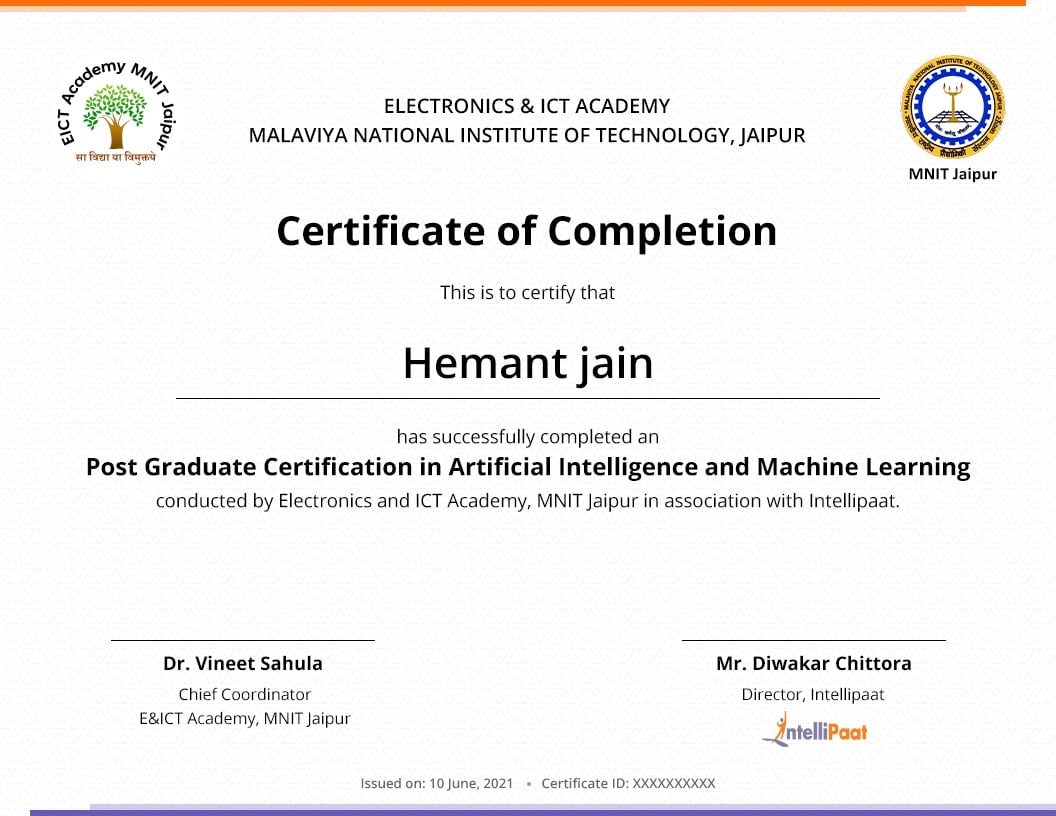Your cart is currently empty.







This Post Graduate program in AI and Machine Learning in collaboration with Microsoft is curated to upskill you in the field of AI and ML and make you an expert in this popular IT domain. Learn from top faculty at MNIT & Industry experts to master Artificial Intelligence, deep learning, neural networking, and other concepts in this domain.
Learning Format
Online
Live Classes
12 Months
Career Services
by Intellipaat
Placement Assistance
Interviews
EMI Starts
at ₹8,000/month*
Our Post Graduate program in AI and Machine Learning is conducted by MNIT, Jaipur faculty in an online instructor-led format to help you master basic and advanced-level skills in Artificial Intelligence and Machine Learning.
About E&ICT MNIT, Jaipur
Electronics & ICT Academy MNIT, Jaipur (E&ICT MNIT, Jaipur) is an initiative supported by the Ministry of Electronics & Information Technology (MeitY), Govt of India. The courses provided by us emphasize bridging the gap between industry demand and academic approach to learning and providing a foundation to build your career in top IT companies.
In this Post Graduate program in AI and Machine Learning, you will:
Key Achievements of MNIT, Jaipur
Program in Collaboration with Microsoft
Benefits for students from Microsoft:
Develop strategies on numerous technologies and frameworks and come up with AI-based solutions for various business problems.
Build robust optimization algorithms for several AI-based applications and services to help the business grow.
Figure out the various business problems created due to the data and solve those by developing data-based models.
Build new models with deep learning techniques, optimize and deploy them on GPUs, and implement them in the robotics software of the company.
Use a varied range of machine learning and artificial intelligence tools to create statistical models using business data.
Design, build, and implement NLP algorithms, use semantic modeling, and write scripts for performance analysis.
Skills to Master
Machine Learning Models
Regressing Modeling
Classification Modeling
Random Forest
Decision Tree Models
K-means Clustering
Times-Series Prediction Model
Deep Learning
TensorFlow
Neural Networking
CuPy
Keras
PyTorch
NLP
Image Processing
Computer Vision
SQL
Tools to Master
SQL Basics –
Advanced SQL –
Deep Dive into User Defined Functions
SQL Optimization and Performance
Python
Linux
In this module, you will get acquainted with the various libraries and functions in Python to help you understand data science and machine learning concepts better.
3.1 PySpark
3.2 Python
3.3 NumPy
3.4 SciPy
3.5 Matplotlib
3.6 Pandas
3.7 Python script
3.8 Python variable
4.1 Regression Modeling: Logical and Linear
4.2 Classification Modeling: K-nearest neighbor, Naïve Bayes Theorem, and Support Vector Machines (SVM)
4.3 Random forest and decision tree models
4.4 Use of PCA, k-means clustering, and isolated forests for anomaly detection
4.5 Time-series prediction model and recommendation system
4.6 Selection, evaluation, and interpretation of models
5.1 Introduction to neural networking
5.2 Backpropagation
5.3 Stochastic gradient descent
5.4 Deep neural networking and its principles
5.5 CNNs, RNNs, LSTMs, and MLPs
5.6 GANs and Generative deep learning
5.7 Calculus and linear algebra
5.8 TensorFlow, CuPy, Keras, and PyTorch
6.1 Natural Language Processing (NLP) and text mining
6.2 Data cleaning and Preprocessing
6.3 Classification of text
6.4 Sentence structuring, language modeling, sequence tagging, and sequence tasks
6.5 Vector space models and semantics
6.6 Dialog systems
7.1 Basics of computer vision and OpenCV
7.2 Use of neural networking for image processing
7.3 Classification and clustering of an image using GANs, multitask classifiers, and k-means
7.4 Detection of object
7.5 Image segmentation
7.6 Computer vision trends
8.1 Development of large-scale AI apps using various tools and techniques
8.2 Build and deploy APIs with FastAPI, Swagger, Paperspace, and Postman
8.3 CI/CD pipeline for model production
8.4 Use of TensorFlow Lite, TensorFlow.js, and Streamlit to package model
8.5 Model production using PyTorch, Spark, and PySpark
9.1 Data collection from RSSs, web scraping, and APIs
9.2 Data cleaning and transformation for ML systems
9.3 Automatic transformation tools
9.4 SQL and NoSQL databases to deal with large sets of data
9.5 Spark
9.6 Pandas
9.7 SQL and Spark SQL
9.8 ScrappingHub
Upon completion of the AI and ML course, you can culminate your Machine Learning and AI skills through a real-world industry-based capstone project that aims to make you use all the skills that you have gained in the program.
11.1 Introduction to R
11.2 R packages
11.3 Sorting DataFrame
11.4 Matrices and vectors
11.5 Reading data from external files
11.6 Generating plots
11.7 Analysis of Variance (ANOVA)
11.8 K-means clustering
11.9 Association rule mining
11.10 Regression in R
11.11 Analyzing the relationship with regression
11.12 Advanced regression
11.13 Logistic Regression
11.14 Advanced Logistic Regression
11.15 Receiver Operating Characteristic (ROC)
11.16 Kolmogorov-Smirnov chart
11.17 Database connectivity with R
11.18 Integrating R with Hadoop
12.1 Introduction to Git
12.2 Architecture of Git
12.3 Working with remote repositories
12.4 Branching and merging
12.5 Git methodology
12.6 Git plugin with IDE (Eclipse)
Projects will be a part of your PG Certification in Artificial Intelligence and Machine Learning to consolidate your learning. It will ensure that you have real-world experience in Data Science and ML

Admission Details
The application process consists of three simple steps. An offer of admission will be made to selected candidates based on the feedback from the interview panel. The selected candidates will be notified over email and phone, and they can block their seats through the payment of the admission fee.
Submit Application
Tell us a bit about yourself and why you want to join this program
Application Review
An admission panel will shortlist candidates based on their application
Admission
Selected candidates will be notified within 1–2 weeks
Total Admission Fee
EMI Starts at
We partnered with financing companies to provide very competitive finance options at 0% interest rate
Financing Partners
![]()
Admissions close once the required number of students is enrolled for the upcoming cohort. Apply early to secure your seat.
| Date | Time | Batch Type | |
|---|---|---|---|
| Program Induction | 26th April 2026 | 08:00 PM IST | Weekend (Sat-Sun) |
| Regular Classes | 26th April 2026 | 08:00 PM IST | Weekend (Sat-Sun) |
Subject matter experts from MNIT, Jaipur, and specialists from top industries will teach you all the basic and advanced level concepts in the field of Machine Learning and Artificial Intelligence. This PG in Artificial Intelligence and Machine Learning will make you an expert and help you acquire all the necessary skills to land a high-income job at a reputed organization.
Intellipaat provides career services that include Guaranteed interviews for all the learners enrolled in this course. EICT MNIT Jaipur is not responsible for the career services.
The trainers of this Machine Learning and Artificial Intelligence training program go through a rigorous selection process in order to make your PG in Machine Learning and AI smooth by assigning the best trainers.
The program is conducted in an online format by expert professionals from E&ICT Academy and MNIT, Jaipur.
You will work on numerous industry-grade projects which will substantiate your learning and provide real-world experience.
The entire post graduate program will be completed over the span of nine months wherein you will learn all the courses and successfully complete the projects.
To be eligible for getting into the placement pool, the learner has to complete the course along with the submission of all projects and assignments. After this, he/she has to clear the Placement Readiness Test (PRT) to get into the placement pool and get access to our job portal as well as the career mentoring sessions.
Please note that the course fees is non-refundable and we will be at every step with you for your upskilling and professional growth needs.
Due to any reason you want to defer the batch or restart the classes in a new batch then you need to send the batch defer request on [email protected] and only 1 time batch defer request is allowed without any additional cost.
Learner can request for batch deferral to any of the cohorts starting in the next 3-6 months from the start date of the initial batch in which the student was originally enrolled for. Batch deferral requests are accepted only once but you should not have completed more than 20% of the program. If you want to defer the batch 2nd time then you need to pay batch defer fees which is equal to 10% of the total course fees paid for the program + Taxes.
Yes, Intellipaat certification is highly recognized in the industry. Our alumni work in more than 10,000 corporations and startups, which is a testament that our programs are industry-aligned and well-recognized. Additionally, the Intellipaat program is in partnership with the National Skill Development Corporation (NSDC), which further validates its credibility. Learners will get an NSDC certificate along with Intellipaat certificate for the programs they enroll in.
What is included in this course?
 Click to Zoom
Click to Zoom
 Click to Zoom
Click to Zoom




























